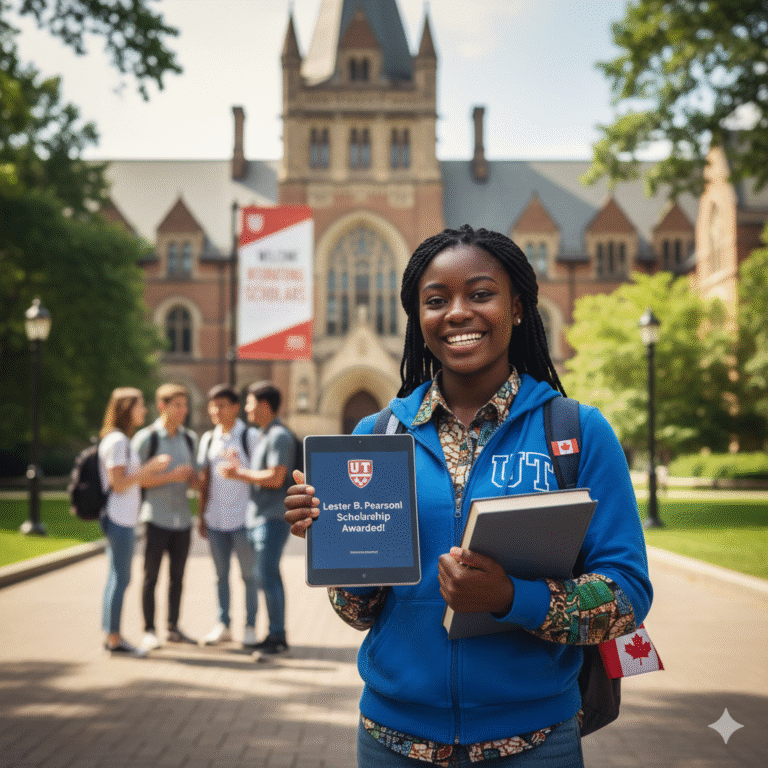DAAD EPOS Scholarship 2026/2027: How to Get a Fully Funded German Master’s (List & Guide)
Step-by-Step Guide to the DAAD EPOS Scholarship: How to Apply and Find Your Course
Trying to figure out the DAAD EPOS scholarship? It’s one of the best ways to get a fully funded Master’s degree in Germany, but that list of courses and the application process can be super confusing.
This post is your complete, step-by-step guide. We’ll break down what the EPOS program is, who it’s for, and exactly how to apply for the 2026/2027 intake.
I’ve seen so many people get stuck on the ‘work experience’ part or miss a deadline. Read this guide to the end, and we’ll show you how to build a strong application and avoid those common mistakes.

What is the DAAD EPOS Scholarship Program?
So, what’s EPOS? It stands for “Development-Related Postgraduate Courses.”
It’s a special scholarship program funded by the German government (through the DAAD).
It’s not for just any student. It’s specifically for young professionals from developing countries (on the official DAAD DAC-List) who have at least two years of relevant work experience.
The main goal is to fund your Master’s (or sometimes PhD) in a subject that can help your home country develop. And the funding is amazing—it’s a fully funded scholarship. It covers your tuition, travel, a monthly stipend, and even health insurance.
What’s the Difference Between “DAAD” and “DAAD EPOS”?
This is the #1 thing that trips people up.
‘DAAD’ (the German Academic Exchange Service) is the organization. They are a giant German scholarship board with hundreds of different programs.
The ‘EPOS’ program is just one of their scholarships. It’s the specific one that requires work experience and focuses on development. You don’t just “apply to DAAD.” You apply for a specific EPOS course at a German university, and that course is funded by the EPOS program.
DAAD EPOS Requirements 2026: Do You Even Qualify?
Before you spend hours writing a motivation letter, let’s do a quick check. This is the ‘gatekeeper’ part. Your application is dead on arrival if you don’t meet these.
- A Bachelor’s Degree: This must be a 4-year degree.
- Your Degree Isn’t Too Old: This is a tough one. The guideline says your graduation should “normally not be more than six years old.” They are very strict about this.
- Two Years of Work Experience: This is the big one. It must be relevant work experience after your Bachelor’s degree. They want to see you’ve already been working in the field you want to study.
- You’re from an Eligible Country: You must be a citizen of a country on the [DAAD DAC-List].
- A Strong ‘Letter of Motivation’: This is your most important document. It’s where you connect your past work, your future study, and your plans to help your country. (We’ll do a full guide on [How to Write a DAAD Letter of Motivation] later).
- English Language Proof: Usually an academic IELTS (band 6) or TOEFL (minimum 80 iBT). Some courses taught in German will require a B1 level at application.
How To Apply for the DAAD EPOS Scholarship (Step-by-Step)
- Find Your Course (The “List”) This is the most important step. You do not apply to DAAD first. You apply directly to the university and the course you want. The EPOS program is just a list of specific courses at different German universities. You can’t just pick any Master’s program. You must pick from the official [DAAD EPOS brochure 2026/2027].
- Check the Course Deadline This is so, so important. Each university has its own deadline. There is no single ‘EPOS deadline.’ Some are in August 2025, some in October 2025, some in December 2025. It’s a mess, I know. You must check the specific course page. If you miss that university’s deadline, you miss your chance for the year.
- Prepare Your Documents You’ll need all the requirements we listed above, plus a few more:
- CV: Use the ‘Europass’ format. Trust me on this. They prefer it.
- Signed Letter of Motivation: We talked about this.
- Reference Letter: From your current employer (it must have an official letterhead, signature, and stamp).
- Confirmation of Employment: A letter from your HR confirming you have worked there for at least two years (and a guarantee of re-employment if possible).
- Certified Copies: You’ll need certified copies (not just photocopies) of your degrees and transcripts.
- Apply to the University You’ll follow the university’s online application process. Some use a portal called ‘Uni-Assist,’ and some have their own. In your application, you must clearly state that you are applying for the DAAD EPOS Scholarship.
- The DAAD Portal (The 2nd Step) This is a step that confuses people. After you apply to the university, a selection committee there will review all the applications. They will suggest the best candidates to DAAD. Then, if you’re one of the suggested candidates, the DAAD will contact you to upload your application to the DAAD Portal.
List of German Government DAAD Scholarships EPOS (Course Examples)
Okay, so where is this magic ‘list’? The list is published every year. You can find the full, official PDF brochure on the DAAD website. Here are some of the main fields and a few course examples to give you an idea.
- Engineering:
- “Hydro Science and Engineering” at TU Dresden
- “Water Resources and Environmental Management” at Leibniz Universität Hannover
- “Sustainable Renewable Energy Technologies” at U Oldenburg
- Economics & Political Science:
- “Development Economics” at U Göttingen
- “Development Management” at RU Bochum
- “Sustainable Development Management” at HS Rhein-Waal
- Health:
- “Master of Science in International Health” at U Heidelberg
- “Global Health” at U Bonn
- Regional Planning:
- “Urban Management” at TU Berlin
- “SPRING – Regional Development Planning” at TU Dortmund
- Agriculture & Forest Sciences:
- “Tropical Forestry” at TU Dresden
- “Agricultural Economics – AgEcon” at U Hohenheim
- Environmental Sciences:
- “Environmental Governance – MEG” at U Freiburg
- “M.Sc. Marine Biology – ISATEC” at U Bremen
Your job is to go to the official DAAD EPOS database and find the one or two courses that perfectly match your work experience.
FAQs on the DAAD EPOS Scholarship
Can I apply for the DAAD EPOS scholarship without work experience? No. This is the one non-negotiable rule. The EPOS program is for professionals, not fresh graduates. You must have a minimum of two years of relevant experience.
How much is the DAAD EPOS stipend? It’s very generous. As of late 2025, it’s 992 euros per month for Master’s students and 1,300 euros for doctoral candidates. This is on top of health insurance, a travel allowance, and a study allowance. It’s more than enough to live on in most German cities.
Can I apply to multiple EPOS courses? Yes, you can apply for up to three courses. But (and this is important) you have to submit one single letter of motivation explaining why you chose those three and what your priority is. My advice? Focus on one or two that are a perfect fit. A weak, generic application to three courses is worse than one amazing, tailored application.
Is my Bachelor’s degree too old? This is a common, frustrating problem. The guideline says your last degree should “normally not be more than six years old.” They are pretty strict about this. If it’s 7 or 8 years, it’s a long shot, but if you have amazing work experience, you can try. Just be aware it’s a major filter.
Do I apply to the DAAD website or the university website? You apply directly to the university first. Do not send your application to the DAAD; they won’t even forward it. The university handles the first round of selection. After you pass that, you’ll be contacted by DAAD to upload your info to their portal.





